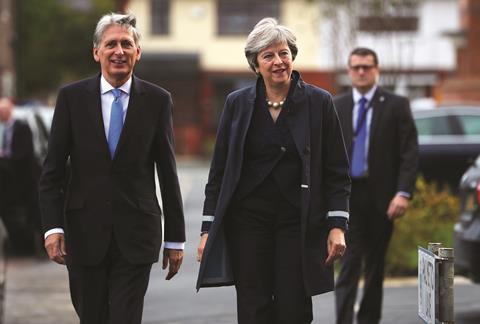Proposal to extend home ownership scheme to the tune of ┬ú10bn is attacked as ÔÇśeconomically illiterateÔÇÖ and likely to lead to higher house prices

By David Blackman in Manchester
Senior Conservatives and built environment figures have criticised the extension of the Help to Buy programme proposed by prime minister Theresa May.
Against a backdrop of concerns in Tory circles that housing gripes fuelled LabourÔÇÖs better than expected performance at JuneÔÇÖs general election, May announced at this weekÔÇÖs Conservative Party conference in Manchester that the scheme will receive an extra ┬ú10bn to help more people buy homes by 2021.
Under the programme, first-time buyers can secure up to a fifth of the cost of buying a new home with a government loan as long as they can put down 5%.
The move will help an estimated 13,000 additional homebuyers over the next few years, doubling the number of people who had used the scheme to buy their own home since Help to Buy was introduced by former chancellor of the exchequer George Osborne in 2013.
But the governmentÔÇÖs move was slammed by former London mayoral candidate Steve Norris at a fringe meeting during the conference.
While insisting that he supported home ownership in principle, he said: ÔÇťIt is simply economically illiterate: if you just increase demand without increasing supply, prices will rise.
ÔÇťIt helps a few people who might have had to settle for something smaller or saved for a couple of years to get a deposit at a huge cost.
It makes just as much sense to put that £10bn of extra money into shared ownership
David Montague, L&Q
ÔÇťI am really horrified we are proposing to add another ┬ú10bn of public spending into this economically illiterate proposition.ÔÇŁ
NorrisÔÇÖ concerns were echoed by Conservative MP Bob Blackman, who represents the London suburban constituency of Harrow East. ÔÇťHelp to Buy is brilliant and enables people to buy but itÔÇÖs inflated prices,ÔÇŁ he said.
ÔÇťWe want to ensure young people get on the housing ladder but we have to put restrictions on the cost of properties that are provided. ItÔÇÖs no good if we just increase the price of houses that people buy.ÔÇŁ
David Montague, chief executive of housing association L&Q, said at a separate fringe meeting that Help to Buy had not been as popular in London as in other parts of the country, with just 9,000 of the 135,000 loans advanced to purchasers in the capital.
He said that would-be home owners in the capital were more likely to benefit from extra funding for shared ownership.
ÔÇťIf it makes sense for ┬ú10bn to go into Help to Buy, it makes just as much sense to put that money into shared ownership.ÔÇŁ
Hew Edgar, policy manager at the RICS, told the conferenceÔÇÖs built environment reception that there were ÔÇťmany avenues and other tenuresÔÇŁ to support housebuilding.
He added: ÔÇťHelp to Buy is a demand solution and supply is the problem.ÔÇŁ
But the extension of Help to Buy was backed by David Thomas, group chief executive of Barratt Developments. ÔÇťAbsent Help to Buy, UK housing supply would drop dramatically: housing numbers went up very, very sharply after its introduction in 2013.ÔÇŁ



























No comments yet